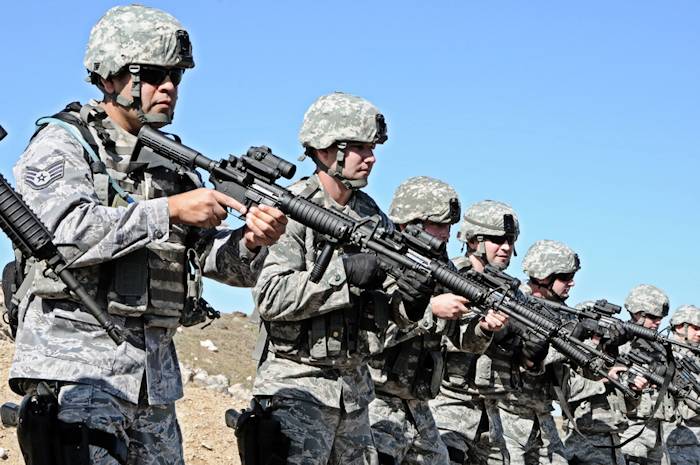|
ORCHARD COMBAT TRAINING CENTER, Idaho -- Two airmen barked "Set!"
as they skidded to a halt and assumed a ready position with rifles
raised behind the remains of a silver sedan riddled with gunshot
holes.
As the dust settled, the airmen heard two teammates
behind them yell, "Cover!" and they responded with "Ready!" Their
teammates yelled "Move!" as shots from simulated enemy fire rang out
and they bolted for a pile of rocks ahead. After reaching cover,
they yelled "Set!" to tell their wingmen they succeeded. The process
started all over again, with one team per cycle, until they reached
their destination at the end of the course.
This scenario
played out over and over during the day as 37 airmen of the 124th
Security Forces Squadron completed their first 124th Fighter Wing
"Shoot, Move, Communicate" training course at the Orchard Combat
Training Center near Gowen Field, Idaho, May 5.
|

Guardsmen of the 124th Security Forces Squadron learn proper techniques and play out scenarios during a Shoot, Move, Communicate course. The specialized training took place at the Orchard Combat Training Center near Gowen Field, Idaho, May 5,
2013. (Air National Guard photo by Tech. Sgt. Becky Vanshur)
|
"While one person moves, someone is always covering them
until they reach their destination," said Airman 1st Class
Jarad Torres, a guardsman from the 124th SFS, who
participated in the training.
This training teaches
these guardsmen to react to a hostile shooter by using cover
and effective communication to maneuver and engage the
target. It is a new annual training requirement throughout
the Air Force so that National Guard and active duty
security forces can deploy together with the same training
and work as a cohesive team in a combat situation.
"The benefit of being out in the field is that we have
obstacles similar to the deployed environment. We have
actual buildings to use here. We can actually set up and use
these buildings instead of having to visualize a scenario,"
said Tech. Sgt. Jason D'Elia, 124th SFS Active Shooter and
Shoot, Move, Communicate training instructor.
The
course at the Orchard Combat Training Center included an
outdoor range where airmen darted through dirt and sagebrush
in search of cover while simulated enemy fire rained down
from shooters perched on cliffs on either side of the course
and from atop a two-story plywood structure. The course also
offered a more urban scenario where the troops applied the
"Shoot, Move, Communicate" principals while their teams
navigated through unfamiliar buildings to engage "enemies."
Later in the day, the trainees played out these
scenarios and engage their "enemies" with simulated rounds
that are similar to paint ball bullets, which allow the
airmen to know if they've been hit because: 1) they hurt and
2) they leave a mark. This simulated fire provides the most
realistic setting because the trainees are actually firing
shots and being shot at while practicing their new skills.
Master Sgt. Steven Kober, of the 124th SFS,
explained that the trainees are far more likely to act as
they would in a real-world scenario if they use the
simulated rounds in training because they actually hurt. The
trainees are required to wear special face protection in
addition to their field gear to ensure that, even though
they hurt, nobody will get injured from the simulated
rounds.
"This is one of my favorite training days, I
got to be a HMMWV convoy commander on the way out and use
the radios. Then when once we got here, we are out shooting
with the [simulated] weapons for the day," said Torres.
The "Shoot, Move, Communicate" training can translate
into many scenarios. It can be used in training in the field
or in urban environments or even in training conducted on
base. It prepares security forces airmen to respond, using
the same tactics to engage a hostile enemy in a wartime
situation, an active shooter on a base or in a civilian
populated urban area.
"I've never been deployed but,
after talking to sergeants that have, it's nice to know that
we train the way we fight," said Torres.
Kober
explained that the 124th SFS will continue the training
every few months until all of their airmen are trained and
continue to improve the course with new scenarios as they
come back for their annual training requirement. They will
also incorporate the "Shoot, Move, Communicate" skills in
the training that they do here on base to ensure that their
troops keep these skills sharp by practicing them throughout
the year.
By USAF Tech. Sgt. Sarah Pokorney
Provided
through DVIDS
Copyright 2013
Comment on this article |



